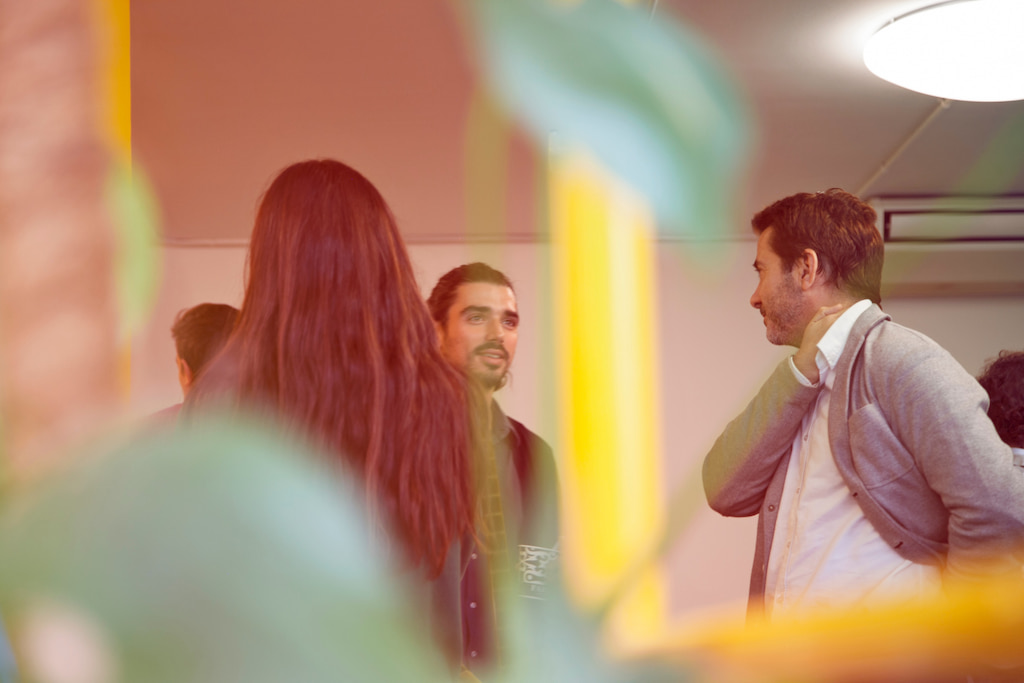Effective Ways to Build a Strong Work Community

Content
Go from having “people that work together” to “supportive teams”
Do you schedule team-building activities, and employees show a lack of interest? Have you noticed a low morale among them that creates a heavy work environment? If so, chances are you don’t have a strong work community, but rather an unhealthy one. Today, you can discover how to use mindfulness at work to change that.
Building a stronger and healthier community can prevent the company from losing talent, capital, and reputation. A smart and effective way to do so, regardless of your industry, is using mindfulness techniques and approaches. Let’s explore some ideas.

Signs You Don’t Have a Strong Work Community
Just like John Donne said, “No man is an island.” Probably the famous English poet never thought this quote would be used in an entrepreneurial context. But it’s perfect for focusing on a critical feature: a company is built on the relationships of its people.
Put yourself in your employee’s shoes. Imagine going to work in a place where communication is not positive and effective, somewhere where social interactions are limited, and recognition is not prioritized.
You begin to feel like no matter what you do, you’ll be stuck in that role. And that your coworkers are not colleagues but simple random folks you can’t engage or trust.
This is how an unhealthy workplace community looks from their point of view.
Other signs managers, people & culture, and human resources teams should look for are:
- Lack of teamwork and collaboration
- High turnover rates
- Low employee engagement and motivation
- Constant conflict and negative behavior
How can your company benefit from a healthy workplace community?
Returning to the thought of people being one of the most important things within a company, we can understand that having a sense of purpose can and will support employees to do their work better, and collaborate with each other to generate trust, respect, empathy, and cooperation.
What you are looking for, essentially, is to make them feel they are chasing more than a paycheck. That they matter, and belong in a place that cares for their well-being and professional development.
When you focus on creating a strong workplace community, the organization:
- Develops efficient support networks
- Cultivates a more supportive and beneficial mental health culture
- Enhances positive, respectful, and mindful communication at all levels
- Increases productivity and reduces procrastination and stress levels
- Makes people feel heard, understood, and valued
- Improves decision-making and problem-solving
- Opens the door to welcoming and creating multiple perspectives and approaches
- Enriches the relationship between managers and employees
- Supports people to embrace their uniqueness and go for bigger goals
Now that we have seen many benefits of having a strong work community, let’s see how we can start developing one.

Mindfulness at work: Simple and effective ways to enhance workplace culture
Open honest, and respectful communication channels
Just like you care about giving feedback honestly and encouragingly, you should also be open to listening to employees. Whether they have positive or challenging comments regarding management, their role, and the organization overall.

Allow them to speak openly in a safe and non-judgmental environment, and promote practices such as mindful communication. Send us a message to book a free demo! Meditopia has many programs and workshops to help employees understand mindful communication and how to practice it.
Well-being oriented activities
They are a natural way to enhance productivity, reduce stress, diminish the chances of developing negative consequences of poor mental health, and boost the team’s morale.
Some examples are group meditations about stress, work-life balance, and anxiety, focus groups to discuss mental health topics, gentle physical activity breaks like yoga and breathing exercises, book clubs, healthy lunch events, etc
Here’s a free meditation break for you to try with your team today:
Practice gratitude
Encourage short-term meetings where leaders and managers celebrate the team’s achievements. Offer rewards and recognition that respond to the company goals and the effort of each team member.
An excellent exercise to promote gratitude and teamwork is separating teams by departments and having people say one thing they admire from another coworker.
Encourage diversity and inclusion
It’s important to make people feel valued and appreciated for who they truly are. This means promoting policies regarding respect toward people’s gender expression, sexual orientation, race, and religion, to develop social and trustworthy relationships with their colleagues and superiors.

If you are interested, Meditopia offers private workshops and webinars about this topic and many others to help you develop a strong workplace community. Send us a message!
Provide opportunities for professional development
Encourage employees to learn new skills, take on new challenges, and provide opportunities for them to apply their knowledge and expertise. It’s a way to make them feel valued and that they are growing professionally, which will enhance employee loyalty and commitment.

Have you tried any of these tips before? Which one would you add to the list? Remember that the key aspect of building a strong workplace community is listening. It leads to caring for your people and provides a broader perspective on their own challenges and how to support them.

